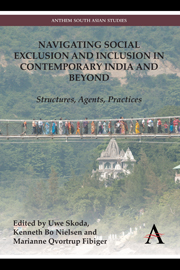 Navigating Social Exclusion and Inclusion in Contemporary India and Beyond
Navigating Social Exclusion and Inclusion in Contemporary India and Beyond from Part I - Spaces and Values
Published online by Cambridge University Press: 05 September 2013
Across a transcultural spectrum of representations, the figure of the househusband is lampooned as a virtual standup comic act with brooms and aprons – stage props of domesticity – signaling a surrender of masculinity. Humourists have had a field day with blokus domesticus (McMahon 1998), nowhere more explicit than cartoon strips and ribald humour. Burlesque images on the Internet cast the house-proud househusband smiling at a food processor or in a state of ecstasy over a shining floor. In one of the cartoons, the caricature is completed by the counter image of the wife/feminine partner reading a financial newspaper, waiting topless for her househusband to iron her business shirt. The sexual imagery heightens the loss – indeed the docile sacrifice – of masculinity and the transference of power to the feminine ‘alter’ ego. The semiotics of househusband cartoons naturalises negative relations between the doing of domestic work and the slaughter of a male self. So persuasive is this image that it has become the privileged representation in a global discourse of degraded masculinities (Krimmer 2000; Wentworth and Chell 2005). The representation has acquired the nomadic ability to occupy spaces in cultural territories where it does not belong, so that right across the world, the term ‘househusband’ immediately connotes a marginal man and a socially disqualified masculinity.
To save this book to your Kindle, first ensure [email protected] is added to your Approved Personal Document E-mail List under your Personal Document Settings on the Manage Your Content and Devices page of your Amazon account. Then enter the ‘name’ part of your Kindle email address below. Find out more about saving to your Kindle.
Note you can select to save to either the @free.kindle.com or @kindle.com variations. ‘@free.kindle.com’ emails are free but can only be saved to your device when it is connected to wi-fi. ‘@kindle.com’ emails can be delivered even when you are not connected to wi-fi, but note that service fees apply.
Find out more about the Kindle Personal Document Service.
To save content items to your account, please confirm that you agree to abide by our usage policies. If this is the first time you use this feature, you will be asked to authorise Cambridge Core to connect with your account. Find out more about saving content to Dropbox.
To save content items to your account, please confirm that you agree to abide by our usage policies. If this is the first time you use this feature, you will be asked to authorise Cambridge Core to connect with your account. Find out more about saving content to Google Drive.